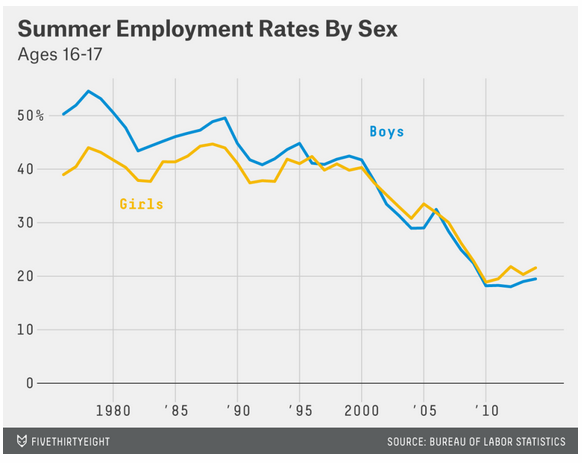Spring is no longer in the air; it’s been swapped out for a feeling of summer in most areas, despite the official kick-off of the season being about three weeks away.
As we speed towards summer, I recently came across some figures from the Bureau of Labor Statistics related to teens in the workforce — frankly, they were alarming.
The stats below had me thinking about summer’s past and how I spent them. I fondly remember having a lawn care business, which I ran with my cousin for a number of summers starting at the age of 10. My first “real” job was as a dishwasher at a local golf course (there’s definitely nothing like starting from the bottom).
I can hardly remember when summer entailed not working, given those days are so far behind me. According to the stats below, teens these days are experiencing work-free summers at a scale we’ve never seen before.

The Entitled Generation?
Call me old school, but this seems odd and slightly disturbing. Why are so many 16- and 17-year-olds not working? Is this part of the larger “entitled generation” movement?
What do I mean by the “entitled generation”? Let me illustrate via an anecdote: I was chatting with a friend whose 14-year-old daughter lost her bracelet at school. Concerned, my friend noted, “Well, let’s go to your school this evening and look for it,” which seemed like a very logical and sensible response to me learning about the lost bracelet. To the logic, the 14-year-old responded, “Do we have to? Can’t we just buy a new one?”
Of course when she said “we”, I can only imagine she meant, “you” (as in the Bank of Dad).
On the other hand, a strong work ethic and an understanding of the value of a dollar was instilled in me at a very young age by my parents. Perhaps then, it’s not the youth who should receive the full brunt of the blame.
The Craft of Honing Your Craft
When I see these stats, I can’t help but feel somewhat concerned about the long-term effects on teens without summer jobs. I recognize these stats aren’t solely reflective of any one factor (i.e. youth not wanting to work), but also things noted in the FiveThirtyEight.com article: “Longer-term forces are also at work, such as the disappearance of many low-skilled jobs that were once the core of the youth job market.”
However, the job market participation rate in these formative years can only aid in the process of learning how to work diligently. The earlier you can program yourself to become a hard worker, the better off you will be in the future.
Further, I have to agree with this from Paul Harrington, an economist at Drexel University in Philadelphia, who has studied the youth labor market:
“If kids don’t work when they’re young, a lot of the behavioral traits that are important just don’t get developed down the road. These are the ages when you’re making these huge decisions about where you’re going to end up in life.”
Next Week's Dividend Advisor
Look for the latest edition of the Dividend Advisor, which is set to hit your inbox on Monday next week. We wrap up with the fourth instalment of the multi-part article, “How to Ruin Your Retirement”, in which we examine some specific examples of how ignoring important risks can really impair your long-term financial health.
Have a great weekend and talk to you on Monday.





